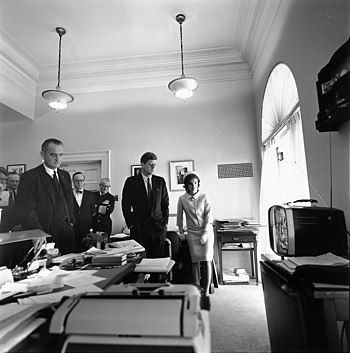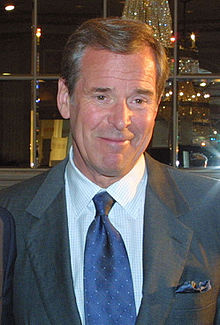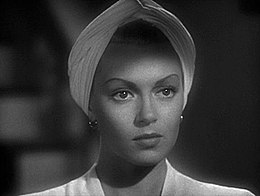Portal:Television
The Television Portal

Television (TV) is a telecommunication medium for transmitting moving images and sound. Additionally, the term can refer to a physical television set, rather than the medium of transmission. Television is a mass medium for advertising, entertainment, news, and sports. The medium is capable of more than "radio broadcasting", which refers to an audio signal sent to radio receivers.
Television became available in crude experimental forms in the 1920s, but only after several years of further development was the new technology marketed to consumers. After World War II, an improved form of black-and-white television broadcasting became popular in the United Kingdom and the United States, and television sets became commonplace in homes, businesses, and institutions. During the 1950s, television was the primary medium for influencing public opinion. In the mid-1960s, color broadcasting was introduced in the U.S. and most other developed countries.
In 2013, 79% of the world's households owned a television set. The replacement of earlier cathode-ray tube (CRT) screen displays with compact, energy-efficient, flat-panel alternative technologies such as LCDs (both fluorescent-backlit and LED), OLED displays, and plasma displays was a hardware revolution that began with computer monitors in the late 1990s. Most television sets sold in the 2000s were flat-panel, mainly LEDs. Major manufacturers announced the discontinuation of CRT, Digital Light Processing (DLP), plasma, and even fluorescent-backlit LCDs by the mid-2010s. LEDs are being gradually replaced by OLEDs. Also, major manufacturers have started increasingly producing smart TVs in the mid-2010s. Smart TVs with integrated Internet and Web 2.0 functions became the dominant form of television by the late 2010s. (Full article...)
Selected article -
Selected image -

John F. Kennedy, Lyndon B. Johnson, and others watching flight of Astronaut Alan Shepard on television. Shepard was the second person and the first American in space. He later commanded the Apollo 14 mission, and was the fifth person to walk on the moon.
Did you know (auto-generated) -

- ... that the replacement of arts listings television show 01-for London was described as "like having to swap a bright yellow curvy Japanese sports car for a dumpy little khaki-coloured old Ford Fiesta"?
- ... that an Illinois radio station closed down to reduce interference with television reception?
- ... that an episode of the children's TV show Arthur featuring a same-sex wedding was not aired on Alabama's PBS network?
- ... that Angeline Quinto has recorded songs for at least 35 films and television soundtracks in the Philippines?
- ... that Chuck Eisenmann went from professionally pitching in baseball to owning and training the dogs that starred on the Canadian television series The Littlest Hobo?
- ... that John Seigenthaler hosted a literary interview program which ran for 42 years on Nashville Public Television?
Selected quote -
More did you know
- ...that David Letterman parodied Werner Erhard in the 1978 Mork & Mindy episode Mork Goes Erk?
- ...that the air-date of "The Beginning of the End", the fourth season premiere of the television series Lost, means that the season may be interrupted by the 2007 Writers Guild of America strike even if a settlement is reached?
- ...that the ABC television network created controversy when they licensed and produced a doll based on fictional rapist Todd Manning?
- ...that the WWF in 1986 introduced a stable of masked wrestlers to keep the injured wrestler Andre the Giant on television, but off the ring?
- ...that the Zambian district of Chiengi has no television or telephone service?
Selected biography -
Peter Charles Archibald Ewart Jennings CM (July 29, 1938 – August 7, 2005) was a Canadian-American television journalist, best known for serving as the sole anchor of ABC World News Tonight from 1983 until his death from lung cancer in 2005. Despite dropping out of high school, Jennings transformed himself into one of American television's most prominent journalists.
Jennings started his career early, hosting a Canadian radio show at age 9. He began his professional career with CJOH-TV in Ottawa during its early years, anchoring the local newscasts and hosting the teen dance show Saturday Date on Saturdays. In 1965, ABC News tapped him to anchor its flagship evening news program. Critics and others in the television news business attacked his inexperience, making his job difficult. He became a foreign correspondent in 1968, reporting from the Middle East. (Full article...)General images
Two pieces of theme music are used for the episodes: one opening theme and one ending theme. The opening theme is "Yume, Hitohira" (夢、ひとひら, lit. Dream, Petal) by Yūko Asami, and the ending theme is "Smile" (スマイル, Sumairu) by Mai Mizuhashi. (Full article...)

Ayushmann Khurrana is an Indian actor, singer, lyricist, music director and television host who works in Hindi films. Khurrana first appeared in 2004 teen drama reality show MTV Roadies, winning the second season of the show. He went to star in many other MTV shows, including MTV Fully Faltoo Movies, Cheque De India and Jaadoo Ek Baar, and hosted multiple television shows, including India's Got Talent and Music Ka Maha Muqqabla. In 2012, he made his feature film debut with the romantic comedy Vicky Donor, about sperm donation, which received critical acclaim and performed strongly at the box office. Khurrana's performance won him the Filmfare Award for Best Male Playback Singer (for the song "Pani Da Rang"), Screen Award for Best Male Debut, Producers Guild Film Award for Best Male Debut, and Producers Guild Film Award for Best Male Playback Singer. He then starred in a series of commercially unsuccessful films, including the comedy-drama Nautanki Saala (2013), romantic comedy Bewakoofiyaan (2014), and drama Hawaizaada (2015).
In 2015, Khurrana starred in the Sharat Katariya-directed romantic drama Dum Laga Ke Haisha opposite Bhumi Pednekar. His performance was praised, and the film emerged as a commercial success. He then starred in Meri Pyaari Bindu (2017), Bareilly Ki Barfi (2017), and Shubh Mangal Saavdhan (2017). The latter two were commercially successful. In 2018, he starred in the black comedy Andhadhun and the comedy-drama Badhaai Ho. The former grossed ₹4.56 billion (US$64 million) worldwide, and became one of Indian cinema's biggest grossers; for his performance he won the National Film Award for Best Actor (shared with Vicky Kaushal for Uri: The Surgical Strike) and the Filmfare Critics Award for Best Actor. Badhaai Ho became a sleeper hit, earning over ₹2.21 billion (US$31 million) worldwide. This success continued with Khurrana's 2019 releases, Article 15, Dream Girl, and Bala. For the first of these, he won the Filmfare Critics Award for Best Actor, and Screen Award for Best Actor (Critics). In the comedy Bala, he played a man plagued with premature balding. (Full article...)
| Season | Episodes | Originally aired | ||
|---|---|---|---|---|
| First aired | Last aired | |||
| 1 | 11 | July 9, 2006 | September 24, 2006 | |
| 2 | 10 | September 30, 2007 | December 2, 2007 | |
| 3 | 8 | November 2, 2008 | December 21, 2008 | |
News
- December 28: US professional wrestler Jon Huber dies aged 41
- September 2: Tributes paid to recently deceased US actor Chadwick Boseman
- May 24: Japanese professional wrestler and Netflix star Hana Kimura dies aged 22
- January 16: BBC newsreader Alagiah to undergo treatment for bowel cancer
- Upcoming events
Featured content
Main topics
History of television: Early television stations • Geographical usage of television • Golden Age of Television • List of experimental television stations • List of years in television • Mechanical television • Social aspects of television • Television systems before 1940 • Timeline of the introduction of television in countries • Timeline of the introduction of color television in countries
Inventors and pioneers: John Logie Baird • Alan Blumlein • Walter Bruch • Alan Archibald Campbell-Swinton • Allen B. DuMont • Philo Taylor Farnsworth • Charles Francis Jenkins • Boris Grabovsky • Paul Gottlieb Nipkow • Constantin Perskyi • Boris Rosing • David Sarnoff • Kálmán Tihanyi • Vladimir Zworykin
Technology: Comparison of display technology • Digital television • Liquid crystal display television • Large-screen television technology • Technology of television
Terms: Broadcast television systems • Composite monitor • HDTV • Liquid crystal display television • PAL • Picture-in-picture • Pay-per-view • Plasma display • NICAM • NTSC • SECAM
Categories
WikiProjects

|
You are invited to participate in WikiProject Television, a WikiProject dedicated to developing and improving articles about Television. |
- Main projects
- Sub-projects
Television Stations • American animation • American television • Australian television • British TV • BBC • Canadian TV shows • Television Game Shows • ITC Entertainment Productions • Digimon • Buffyverse • Doctor Who • Degrassi • EastEnders • Episode coverage • Firefly • Futurama • Grey's Anatomy • Indian television • Lost • Nickelodeon • The O.C. • Professional Wrestling • Reality TV • The Simpsons • Seinfeld • South Park • Stargate • Star Trek • Star Wars • Soap operas • Avatar: The Last Airbender • House
- Related projects
Animation • Anime and manga • Comedy • Comics • Fictional characters • Film • Media franchises
What are WikiProjects?
Things you can do

- Place the {{WikiProject Television}} project banner on the talk pages of all articles within the scope of the project.
- Write: Possible Possum
- Cleanup: color television, Alien Nation: Body and Soul, The Sopranos, Alien Nation: Dark Horizon, Alien Nation: The Enemy Within, Alien Nation: Millennium, Aang
- Expand: Timeline of the introduction of color television in countries
- Stubs: Flow (television), Just for Kicks (TV series), Play of the Month, Nova (Dutch TV series), More stubs...
Subportals
Related portals
Associated Wikimedia
The following Wikimedia Foundation sister projects provide more on this subject:
-
Commons
Free media repository -
Wikibooks
Free textbooks and manuals -
Wikidata
Free knowledge base -
Wikinews
Free-content news -
Wikiquote
Collection of quotations -
Wikisource
Free-content library -
Wikiversity
Free learning tools -
Wiktionary
Dictionary and thesaurus



























































